Back and Spinal cord Flashcards
(84 cards)
1
Q

A
ala
2
Q

A
anterior sacral foramina
3
Q

A
anterior arch of the atlas
4
Q

A
atlas anterior tubercle
5
Q

A
lateral mass of the atlas
6
Q
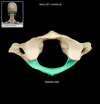
A
posterior arch of the atlas
7
Q

A
posterior tubercle of the atlas
8
Q
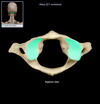
A
superior articular process of the atlas
9
Q

A
atlas
10
Q

A
axis
11
Q
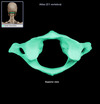
A
atlas
12
Q
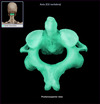
A
axis
13
Q
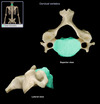
A
body of a cervical vertebra
14
Q

A
lamina of a cervical vertebra
15
Q
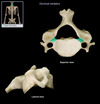
A
pedicle of a cervical vertebra
16
Q

A
cervical superior articular facet
17
Q
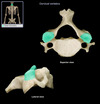
A
cervical superior articular process
18
Q

A
cervical transverse foramen
19
Q

A
cervical transverse process
20
Q

A
cervical vertebrae
21
Q

A
cervical vertebrae
22
Q

A
dens
23
Q

A
inferior articular process of cervical vertbra
24
Q

A
intervertebral foramen
25

lumbar body
26

lumbar inferior articular process
27

lumbar lamina
28

lumbar pedicle
29
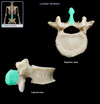
lumbar spinous process
30

lumbar superior articular process
31

lumbar transverse process
32

lumbar vertebrae
33

lumbar vertebrae
34
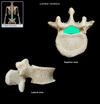
vertebral foramen
35

median sacral crest
36

nuchal ligament
37

posterior sacral foramena
38

auricular surface of the sacrum
39

sacral cornua
40

sacral hiatus
41

sacral promontory
42
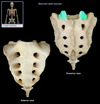
superior articular process of the sacrum
43

costal facet, thoracic body
44

thoracic body
45

inferior costal facet of the thoracic body
46
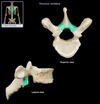
thoracic lamina
47
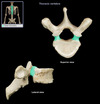
thoracic pedicle
48

thoracic spinous process
49

thoracic superior articular process
50
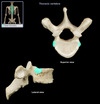
thoracic superior costal facet
51
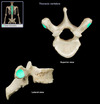
thoracic transverse process costal facet
52

thoracic transverse process
53

thoracic vertbrae
54

vertebral prominens
55
what is a bifid spinous process and why is it significant
a bifid spinal process is a spinal process that has two prongs
C2-6 normally have bifid proceses, other vertebrae do not
56
uncus of the body
hook like projections from the superior surface of the body that are received by shallow grooves on the inferior surface of the superior body
57
what is the groove of a spinal nerve
a lateral groove on the superior surface of a normal transverse process
58
what are the two areas indicated by A? What do they form?
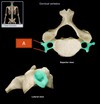
the anterior and posterior tubercle of the cervical transverse process
the groove that holds tha spinal nerve
59
what is the sacral canal
the continuation of the spinal canal into the sacrum
60
what is A indicating

the tubercle for attachment of the transverse ligament of the atlas
61
what is the carotid tubercle
the anterior tubercle of the C6 vertbrae
62

A) mammillary process
B) Accessory process
63
where are the accessory processes of the spine found and what do they do
the posterior surface of the lumbar transverse processes
provide attachment for the intertransversarii muscles
64
where are the mammillary processes of the spine and what is their function
on the posterior surface of the lumbar superior articular processes
provide attachment for the multifidus and intertransversarii
65
what is the base of the sacrum
the superior surface of the sacrum
66
what is the base of the sacrum
the tapered inferior end of the sacrum
67
what is the pelvic surface of the sacrum
the flat anterior portion
68
what are the transverse lines of the sacrum and where are they found
they are four lines indicating the four fused vertebrae of the sacrum
the pelvic surface of the pelvis
69

A) lateral crest
B) medial crest
C) intermediate crest
70
where are the zygapophyseal joint capsules found
between the articular facets of adjacent superior and inferior vertbrae
71
what are the ligamentum flavum and where are they found
ligaments of the spine that connect the lamina of adjacent vertrbae from C2 to S1
72
where are the interspinous ligaments found
vertically connecting the spinous processes of adjacte vertebrae
73
supraspinous ligament
connects the tips of the spinous processes of adjacent vertbrae
74
anterior longitudinal ligament
runs along the anterolateral side of the vertebral column connecting the bodies of adjacent vertebrae
75
posterior longitudinal ligament
runs along the posterior surface of the vertebral bodies and attaches to the IV discs
76
what is this? where is it found?

the posterior atlanto occipital membrane
between the posterior arch of the atlas and the foramen magnum
77
what is this? where is it found

the anterior atlanto occipital membrane
between the anterior arch of the axis and the anterior foramen magnum
78

A) anterior atlanto-occipital membrane
B) anterior atlanto-axial membrane
C) posterior atlanto-occipital membrane
D) posterior atlanto-axial membrane
79

A) tectorial membrane
B) Alar ligament
C) transverse ligament
80
what is the tectorial membrane
a continuation of a the posterior longitudinal ligament that passes posteriorly over the medain atlanto-axial joint into the skull
81
where does the tectorial membrane attach
starts at the the body of C2 to the interior surface of the occipital bone
82
where are the alar ligaments found
running between the dens and the lateral margins of the foramen magnum
83
what does the transverse ligament do
forms the posterior support around the dens between the tubercles of the lateral masses of C1
84

A) Alar ligaments
B) cruiciate ligaments
C) transverse ligaments


